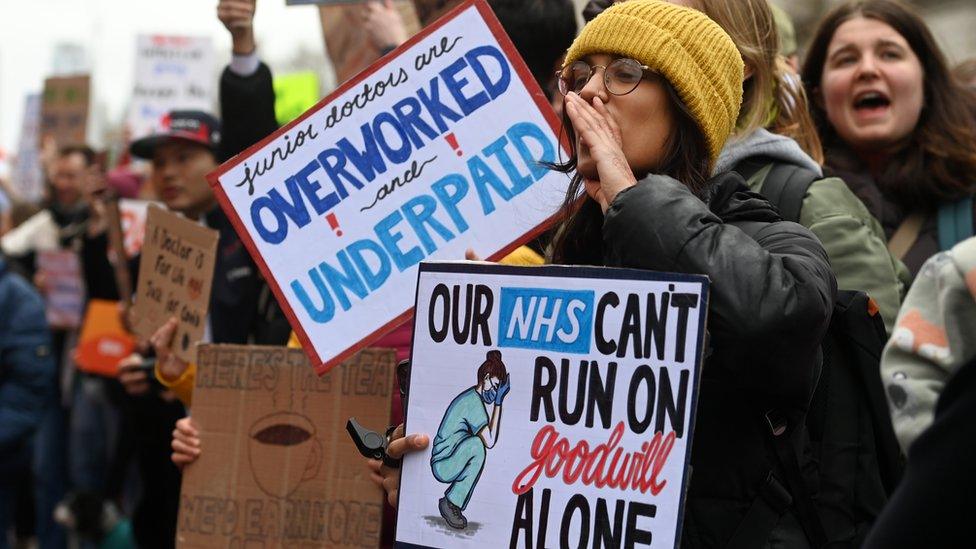Junior doctors to hold longest strike yet in July
- Published

Junior doctors in England have announced a new five-day walkout in July - the longest yet - over pay.
The strike will take place between 07:00 on Thursday 13 July and 07:00 on Tuesday 18 July.
The British Medical Association (BMA) union, which represents doctors, said a government offer of a 5% rise was not "credible" and that pay has not kept up with inflation.
Ministers say the pay offer is "fair and reasonable".
BMA negotiator have been asking for a 35% increase to make up for 15 years of below-inflation rises.
This will be the fourth strike by junior doctors since the pay dispute began.
Thousands of planned appointments will need to be postponed while more senior doctors fill in to provide emergency care.
Prime Minister Rishi Sunak's spokesman said the new strike was "extremely disappointing".
"It puts patient safety and our efforts to cut waiting lists at risk," he told reporters, insisting the government's offer was "fair and reasonable".
The Department of Health and Social Care said in a statement: "The government has been clear that strikes must be paused while talks take place, and we remain ready to continue talking at any point if strikes are called off."
Co-chairs of the BMA junior doctors committee Dr Robert Laurenson and Dr Vivek Trivedi said: "We are announcing the longest single walkout by doctors in the NHS's history - but this is not a record that needs to go into the history books.
"Even now the government can avert our action by coming to the table with a credible offer on pay restoration."
Sir Julian Hartley, chief executive of NHS Providers, said: "Trust leaders, staff and patients will have that sinking feeling at the prospect of five straight days of strike disruption, the longest-ever single period of industrial action in the history of the NHS.
"After a three-day walkout by junior doctors already this month, forcing more than 100,000 more procedures and appointments to be rescheduled (more than 651,000 in total since December) and with nurses, radiographers and consultants - who could strike for two days in July - being balloted too this figure is bound to rise by many thousands more.
"Trust leaders' priority throughout any industrial action will remain to keep patients safe and deliver high-quality care but this is getting tougher the longer strikes persist, and it's getting more and more expensive to find cover for staff on picket lines."
Junior doctors make up around half of all hospital doctors in England and a quarter of all doctors working in GP surgeries. The BMA represents over 46,000 junior doctors in the UK.
In Scotland, junior doctors have been offered a new 14.5% pay rise over a two-year period after negotiations with the Scottish government.
BMA Scotland said three days of strike action would take place between 12 and 15 July unless an improved offer was made.

Are you a doctor with a view on the strike? Are you a patient affected? Share your experiences by emailing haveyoursay@bbc.co.uk, external.
Please include a contact number if you are willing to speak to a BBC journalist. You can also get in touch in the following ways:
WhatsApp: +44 7756 165803
Tweet: @BBC_HaveYourSay, external
Please read our terms & conditions and privacy policy
If you are reading this page and can't see the form you will need to visit the mobile version of the BBC website to submit your question or comment or you can email us at HaveYourSay@bbc.co.uk, external. Please include your name, age and location with any submission.
- Published18 May 2023